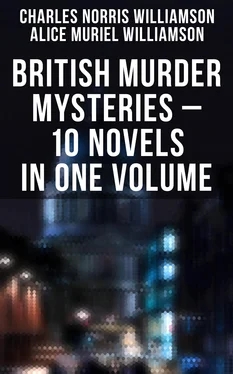"But, sir, if the car's delayed—"
"Well," cut in Sir Samuel, "we must chance it, I'm afraid. The fact is, her ladyship is in such a nervous state that I don't care to put any more doubts into her head. She's made up her mind what she wants, and we'd better let it go at that."
If I'd been near enough to my brother I should have stamped on his foot, or seized some other forcible method of suggesting that he should kindly hold his tongue. As it was, my only hope lay in an imploring look, which he did not catch. However, in pity for Sir Samuel he said no more; and before we were three minutes older, if her ladyship had yearned to have me back, it would have been too late. We were off together, and another day had been given to us for ours.
The chauffeur proposed that I should sit inside the car; but I had regained all my courage in the hot inn-kitchen. I was not cold, and didn't feel as if I should ever be cold again.
The road mounted almost continuously. Sometimes, as we looked ahead, it seemed to have been broken off short just in front of the car, by some dreadful earth convulsion; but it always turned out to be only a sudden dip down, or a sharp turn like the curve of an apple-paring. At last we had reached the highest peak of the Roof of France—a sloping, snow-covered roof; but steep as was the slant, very little of the snow appeared to have slipped off.
The Cévennes on our right loomed near and bleak; the Auvergne stretched endlessly before us, and the virgin snow, pure as edelweiss, was darkened in the misty distance by patches of shadow, purple-blue, like beds of early violets.
At first but a thin white sheet was spread over our road, but soon the lace-like fabric was exchanged for a fleecy blanket, then a thick quilt of down, and the motor began to pant. The winds seemed to come from all ways at once, shrieking like witches, and flinging their splinters of ice, fine and small as broken needles, against our cheeks. Still I would not go inside. I could not bear to be warm and comfortable while Jack faced the cold alone. I knew his fingers must be stiff, though he wouldn't confess to any suffering, and I wished that I knew how to drive the car, so that we might have taken turns, sitting with our hands in our pockets.
In the deepening snow we moved slowly, the wheels slipping now and then, unable to grip. Then, on a steep incline, there came a report like a revolver shot. But it didn't frighten me now. I knew it meant a collapsed tyre, not a concealed murderer; but there couldn't have been a much worse place for "jacking up." Nevertheless, it's an ill tyre that blows up for its own good alone, and the forty minutes out of a waning afternoon made the chauffeur's cold hands hot and the hot engine cold.
Starting on again, we had ten miles of desolation, then a tiny hamlet which seemed only to emphasize that desolation; again another ten-mile stretch of desert, and another hamlet; here and there a glimpse of the railway line, like a great black snake, lost in the snow; now and then the gilded picture of an ancient town, crowning some tall crag that stood up from the flat plain below like a giant bottle. And there was one thrilling view of a high viaduct, flinging a spider's web of glittering steel across a vast and shadowy ravine. "Garabit!" said the chauffeur, as he saw it; and I remembered that this road was not new for him. He did not talk much. Was he thinking of the companion who perhaps had sat beside him before? I wondered. Was it because he thought continually of her that he looked at me wistfully sometimes, often in silence, wishing me away, maybe, and the woman who had spoilt his life by his side again for good or ill?
Suddenly we plunged into a deep snow-bank which deceitfully levelled a dip in the road, and the car stopped, trembling like a horse caught by the hind leg while in full gallop.
On went the first speed, most powerful of all, but not powerful enough to fight through snow nearly up to the hubs. The Aigle was prisoned like a rat in a trap, and could neither go back nor forward.
"Well?" I questioned, half laughing, half frightened, at this fulfilment of the morning's prophecy.
"Sit still, and I'll try to push her through," said Jack jumping out into the deep snow. "It's only a drift in a hollow, you see; and we should have got by the worst, just up there at St. Flour."
I looked where his nod indicated, and saw a town as dark and seemingly as old as the rock out of which it grew, climbing a conical hill, to dominate all the wide, white reaches above which it stood, like an armoured sentinel on a watch-tower. As I gazed, struck with admiration, which for an instant made me forget our plight, he began to push. The car, surprised at his strength and determination, half decided to move, then changed her mind and refused to budge. In a second, before he could guess what I meant to do, I had flashed out of my seat into the snow, and was wading in his tracks to help him when he snatched me up—a hand on either side of my waist—and swung me back into my place again.
"Little wretch!" he exclaimed. "How dare you disobey me?"
Then I was vexed, for it was ignominious to be treated as a child, when I had wanted to aid him like a comrade.
"You are very unkind—very rude," I said. "You wouldn't dare to do that, or speak like that to Her ."
He laughed loudly. "What—haven't you forgotten 'Her?'" (As if I ever could!) "Well, I may tell you, it's just because I did dare to 'speak like that' to a woman, that I'm a chauffeur stuck in the snow with another man's car, and the—"
"The rest is another epithet which concerns me, I suppose," I remarked with dignity, though suddenly I felt the chill of the icy air far, far more cruelly than I had felt it yet. I was so cold, in this white desolation, that it seemed I must die soon. And it wouldn't matter at all if I were buried under the drifts, to be found in the late spring with violets growing out of the places where my eyes once had been.
"Yes," said he, in that cool way he has, which can be as irritating as a chilblain. "It was an epithet concerning you, but luckily for me I stopped to think before I spoke—an accomplishment I'm only just beginning to learn."
I swallowed something much harder and bigger than a cannon ball, and said nothing.
"Of course you're covered with snow up to your knees, foolish child!" He was glaring ferociously at me.
"It doesn't matter."
"It does matter most infernally. Don't you know that you make no more than a featherweight of difference to the car?"
"I feel as if I weighed a thousand pounds, now."
"It's that snow!"
"No. It's you. Your crossness. I can't have people cross to me, on lonely mountains, just when I'm trying to help them."
His glare of rage turned to a stare of surprise. "Cross? Do you think I was cross to you?"
"Yes. And you just stopped in time, or you would have been worse."
"Oh, I see," he said. "You thought that the 'epithet' was going to be invidious, did you?"
"Naturally."
"Well, it wasn't. I—no, I won't say it! That would be the last folly. But—I wasn't going to be cross. I can't have you think that, whatever happens. Now sit still and be good, while I push again."
I weighed no more than half the thousand pounds now, and the cannon ball had dissolved like a chocolate cream; but the car stood like a rock, fixed, immutable.
"There ought to be half a dozen of me," said the chauffeur. "Look here, little pal, there's nothing else for it; I must trudge off to St. Flour and collect the missing five. Are you afraid to be left here alone?"
Of course I said no; but when he had disappeared, walking very fast, I thought of a large variety of horrors that might happen; almost everything, in fact, from an earthquake to a mad bull. As the sun leaned far down toward the west, the level red light lay like pools of blood in the snow-hollows, and the shadows "came alive," as they used when I was a child lying awake, alone, watching the play of the fire on wall and ceiling.
Читать дальше












